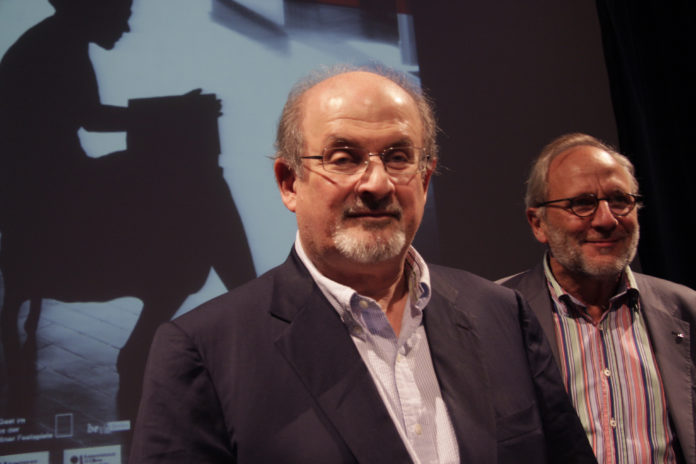Abdul Wahid, chairman of Hizb ut-Tahrir Britain, argues that Salman Rushdie and The Satanic Verses have been adopted by the West and the mainstream media for their own larger agenda against Islam.
In September 1988 I was just embarking on my third year at medical school. In those first few days of term, I saw an advertisement for the launch of Salman Rushdie’s new work in a large bookshop near my university – where the author himself was signing copies of the book.
I had come across Rushdie some three years before. I had read “Midnight’s Children” – the story of post-independence India, told through the stories of characters born at the stroke of midnight at the time of independence from Britain, using the style of magical realism. I read the subsequent novel “Shame,” set in the world of Pakistani politics, with the main characters caricatures of Zulfikar Ali Bhutto, his daughter Benazir and General Zia ul Haq.
Rushdie’s irreverence for political figures was clear from this second novel, mocking and denigrating the characters – the Benazir character was referred to throughout as ‘the Virgin Ironpants.”
At that time, my understanding of Islam was very basic. I believed in Allah because it made sense – as I did some of the other tenets of Islam. At that time, what didn’t make sense might be best described as being “parked for another time.” The Seerah of the Prophet (صلى الله عليه و سلم) was only known to me through the film The Message (which had a huge impact on me, aged 9). I certainly had no detailed understanding of the rights of the Messenger of Allah (صلى الله عليه و سلم) as expounded by Qadi Iyad in his great work, Al Shifa. Like most people in secular societies, religion had become at most a peripheral matter in life – births, deaths, weddings and not much else.
It was against this background that I was excited to meet Salman Rushdie in 1988, and pay what was a small fortune for me as a student, for the newly published book. Rushdie signed the book, stopped for a chat for a couple of minutes, and was even willing to take a phone number and meet at a later date to discuss the experience of the second generation people living in the UK. It was an exciting moment.
I tried to read the book when I bought it, found it impenetrable from a stylistic perspective, and didn’t have the patience to continue. The novelty of having a signed copy of this first edition wore off as the expenses of the academic year progressed.
Subscribe to our newsletter and stay updated on the latest news and updates from around the Muslim world!
But by 1989 the controversy had kicked off significantly. Protests in the UK were covered in the media, and I am sorry to say I looked at them with a degree of embarrassment – not understanding the real concerns of the people protesting. After Ayatollah Khomeini issued his fatwa ordering Rushdie’s killing in 1989, it was clear this particular Pandora’s Box would never be closed. The debate was forever framed to be between “over-emotional” Muslim protestors who were burning copies of the book, and proponents of “free speech” for whom Rushdie was now an icon.
I decided I needed to read the book to understand for myself what the problem was as I truly found it hard to comment from just hearing second hand media reports about the book. So I struggled through it.
The Satanic Verses
The story centred around two characters – neither of whom were likeable.
The main character in the book had a series of disturbing dreams, eventually having a mental breakdown and killing himself. The dream sequences involved an imaginary Arabian prophet. Much of the media commentary at the time was about the so-called “Satanic Verses” incident – which (although I did not know it then) has been dragged out by many orientalists over the years – and which has been refuted and rejected by Muslims many times over.
However, it was in the descriptions of the Arabian prophet and his wives that I really came to understand why the issue had caused so much upset. They were derogatory in the extreme, to the point that I – as what can only be called a “nominal Muslim” at the time, who was not willing to judge until I had seen the evidence myself, and was embarrassed by the protests in the UK – genuinely felt my stomach turn as I read them.

Unquestionably, Rushdie – who grew up in a Muslim family in Bombay – would know better than I that this would be like a knife into the hearts of hundreds of millions of Muslims who would see it as a thinly veiled attack on their Prophet – more insulting than if he had accused their own mothers and children of the most base behaviour.
It was that recognition that made me realise I could never side with Rushdie. I may not have liked the fatwa, but I understood why people supported it. I might have found the protests embarrassing, but I understood what had injured them. This was not a man speaking truth to power – this was a man selling out the people of his roots, to be warmly embraced by the white liberal society that has championed him ever since.
This was not just appreciated by Muslims alone. The writer Roald Dahl called Rushdie “a dangerous opportunist” who “must have been totally aware of the deep and violent feelings his book would stir up among devout Muslims.” Similarly, the author John le Carré wrote at the time that nobody had “a God-given right to insult a great world religion and be published with impunity.”
British Muslims
The Rushdie affair was a milestone for Muslims in the West. Just as people like me had personal choices of where we stood, the British government realised then that the Muslim community was not evolving as they had expected in their multicultural system – which they had hoped would secularise ( i.e. westernise) the immigrant population over a generation. They had similar realisations a few years later with the first Gulf War, and then the war in Bosnia, and then again after the second intifada, and most famously after the war in Afghanistan following 9/11.
As the years progressed, people like me learned the extent of the love which Muslims worldwide hold for the Messenger of Allah (صلى الله عليه و سلم) – and learned to share in that. I learned what it meant when the Prophet (صلى الله عليه و سلم) said:
لاَ يُؤْمِنُ أَحَدُكُمْ حَتَّى أَكُونَ أَحَبَّ إِلَيْهِ مِنْ وَلَدِهِ وَوَالِدِهِ وَالنَّاسِ أَجْمَعِينَ
“None of you have faith until I am more beloved to him than his children, his father, and all of the people” – which means loving him (صلى الله عليه و سلم) even more than we love ourselves – which utterly contradicts what liberal societies nurtures in people in terms of individualism.
At the same time the secular state in Britain started looking for ways to engage the Muslim community, to evolve their project to westernise the Muslims – first by engaging with “community leaders” and organisations, but later – when this failed – to use a more muscular liberal approach, and even security strategies like Prevent.
All of this explains much of where the harsh media approach to Islam and policies have come from – coupled with concerns in the West about the obvious Islamic revival across the world, which would ultimately progress to see the re-establishment of Islam on the world stage – where sincere noisy protests wouldn’t be the way of forbidding this munkar, but the actions of a sincere government that seeks to uphold Islam.
Ever since the demise of the Ottoman Khilafah, there has been no government in the world that speaks for Islam on the global stage. Whereas before rulers would have used economic, diplomatic or even military policies to pressure secular states to stop such insults against the Messenger of Allah (صلى الله عليه و سلم), today they only offer a few feeble words of condemnation – whilst continuing to engage with those states which uphold these insults on a regular basis.
The issue of the “Satanic Verses” is much bigger than its author. The book has been adopted by governments of the West who celebrate Rushdie and honour him – along with Western liberal elites. Whereas some of these elites genuinely believe in the right of authors to be freely published, many of them along with the politicians have effectively used this man and his book for their own larger agenda against Islam, much as they have some rulers in the Muslim world – from the likes of the Shah of Iran in the past to Ashraf Ghani more recently.

I am sure the commentary in the aftermath of the attack on Rushdie will start with words of sympathy for the author – but then move on to the same old attacks on Islam and Muslims being against free speech and being for violence.
But over the last thirty years, I have learned to see the double standards in this argument – in part through understanding Islam, but also through seeing the actions of the West. Islam obliges speech that holds its rulers to account. It obliges enjoining good and forbidding evil. It commands intellectual inquiry. But it forbids insulting anyone’s sanctities.
Secular societies, by contrast, are riddled with contradictions on “free speech.” They consider Rushdie a champion of free speech, honour and praise him. Yet they condemn the uber-liberal JK Rowling for saying a man who identifies as a woman is not in fact a woman. Students who protest about the Zionist occupation of Palestine have been silenced by accusations of antisemitism. Yet they prosecuted a man who posted an offensive tweet about Captain Tom. And a schoolboy was interviewed by police without his parents when his school reported him for saying homosexuality was sin.
Through policies, laws, workplace rules and social media algorithms they control what is acceptable speech and what is not!
Islam abhors violence, with almost every matter which involves the shedding of blood being either self defence, a part of a judicial process beyond any doubt (not even reasonable doubt), or what would be called the foreign and defence policy of a political authority.
But still Muslims are expected to condemn the extrajudicial assasination attempt on a man who has abused their beloved, by people who are happy to remain silent over the extrajudicial assassination of Qasim Soleimani, or various Iranian nuclear scientists, and support the capitalist system that has dominated the world over arguably the most violent century in human history.
All of this double standard deserves contempt. There is of course, no such thing as “free speech.” Yet free speech seems to be absolute when it is the right to insult Islam. For me, when they point the finger at Islam, it is these double standards deserve exposing.
As for the book, I didn’t keep it. I didn’t give it away. I didn’t give it to a second hand book shop. I threw the autographed copy of a first-edition straight in the bin.
























